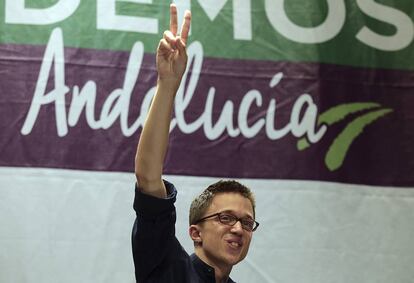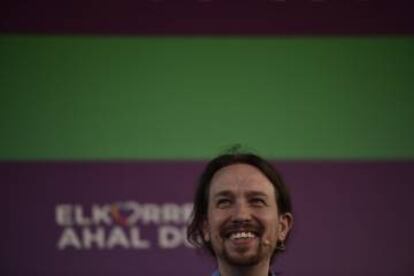Venezuelan assembly asks Spain for help with Podemos investigation
Lawmakers send letters to Spanish Treasury department, police and company register, and also ask top party officials to come testify in Caracas on July 6

The Venezuelan National Assembly is asking Spain for help in its investigation of Podemos, the Spanish leftist party that could come in second at Sunday’s general elections.
Venezuela’s legislative chamber, which is controlled by opponents of the Nicolás Maduro administration, is examining allegations that Podemos may have been funded with money from Maduro’s predecessor, the late Hugo Chávez.
The anti-austerity party has denied any ties between its own financing and the Latin American government. But Venezuelan legislators want to know if the €7.16 million allegedly paid by Chávez to a Spanish foundation between 2003 and 2011 for advisory work was really an undercover way of funding a party with chavista sympathies in Spain.
We are not accusing them, we are not prosecutors
Freddy Guevara, Venezuelan National Assembly
According to documents accessed by EL PAÍS, the National Assembly has sent letters to the Spanish Treasury department, the national police unit specializing in financial crimes (UDEF), the judiciary police and the company register, requesting their assistance in the investigation.
Venezuelan lawmakers have also called in Podemos officials for statements, including party founders Pablo Iglesias, Íñigo Errejón and Juan Carlos Monedero. The letters ask them to be present at the National Assembly on July 6.
Last week, Freddy Guevara, president of the National Assembly’s Comptroller Commission, launched an investigation into payments by the former Venezuelan administration to Centro de Estudios Políticos y Sociales (Center for Political and Social Studies, or CEPS), a foundation whose board members included leading Podemos officials.
Sign up for our newsletter
EL PAÍS English Edition has launched a weekly newsletter. Sign up today to receive a selection of our best stories in your inbox every Saturday morning. For full details about how to subscribe, click here.
The money transfers ended in 2011. Chávez himself died in March 2013, and Podemos was founded in 2014.
Guevara has stated that “we analyzed whether the type of tasks entrusted to the foundation bore any relation to the amount of money it was paid, and the answer was no, it was an exorbitant amount of money.”
Podemos leader Pablo Iglesias has already said he will not be going to Venezuela to provide explanations. He denied any financial ties between his party and the Venezuelan government, and noted that any probes into such matters fall to the Spanish courts. Guevara, for his part, said he is ready to go to the courts if his requests for cooperation are unmet.
“For someone to refuse to cooperate is a very clear indication that something did happen. We could initiate a court proceeding right now,” said Guevara in a telephone conversation with EL PAÍS. “Let’s recall that foreign citizens can be asked to testify in other countries. […] We are not asking them what they did with funding obtained in Spain, or with the money made from teaching, we are asking what they did with Venezuelan money. Countries have international treaties against corruption and they must cooperate. We have the duty to activate all available mechanisms.”

Guevara has asked the Spanish Treasury department for information on CEPS’ income tax statements between 2002 and 2016. The UDEF and judiciary police are being asked for transcripts of statements made by a former Venezuelan finance minister, Rafael Isea, to the effect that the Venezuelan executive paid out large amounts of money to CEPS. The story was picked up by the Spanish newspaper Abc, which reported on a document signed by Hugo Chávez releasing €7 million to create in Spain “political forces and social movements, propitiating political changes in that country with greater affinities with the Bolivarian government.”
“We are looking for information that will tell us whether that outlay existed, whether there was a transfer from the foundation to the party, and whether things that were said to have one destination ended up somewhere else,” said Guevara. “We are trying to ascertain whether that money was declared, and under what category. If any illegal action took place, there must have been some attempt at legitimizing or laundering the money, and that is why we need information from Spanish authorities to guide us on this matter.”
“We are not accusing them, we are not prosecutors,” added the Venezuelan deputy. “But it would reflect very poorly on Pablo Iglesias if he refused to answer an institution that is sister to the one he sits in, about money obtained from public funds.”
English version by Susana Urra.
Tu suscripción se está usando en otro dispositivo
¿Quieres añadir otro usuario a tu suscripción?
Si continúas leyendo en este dispositivo, no se podrá leer en el otro.
FlechaTu suscripción se está usando en otro dispositivo y solo puedes acceder a EL PAÍS desde un dispositivo a la vez.
Si quieres compartir tu cuenta, cambia tu suscripción a la modalidad Premium, así podrás añadir otro usuario. Cada uno accederá con su propia cuenta de email, lo que os permitirá personalizar vuestra experiencia en EL PAÍS.
¿Tienes una suscripción de empresa? Accede aquí para contratar más cuentas.
En el caso de no saber quién está usando tu cuenta, te recomendamos cambiar tu contraseña aquí.
Si decides continuar compartiendo tu cuenta, este mensaje se mostrará en tu dispositivo y en el de la otra persona que está usando tu cuenta de forma indefinida, afectando a tu experiencia de lectura. Puedes consultar aquí los términos y condiciones de la suscripción digital.








































